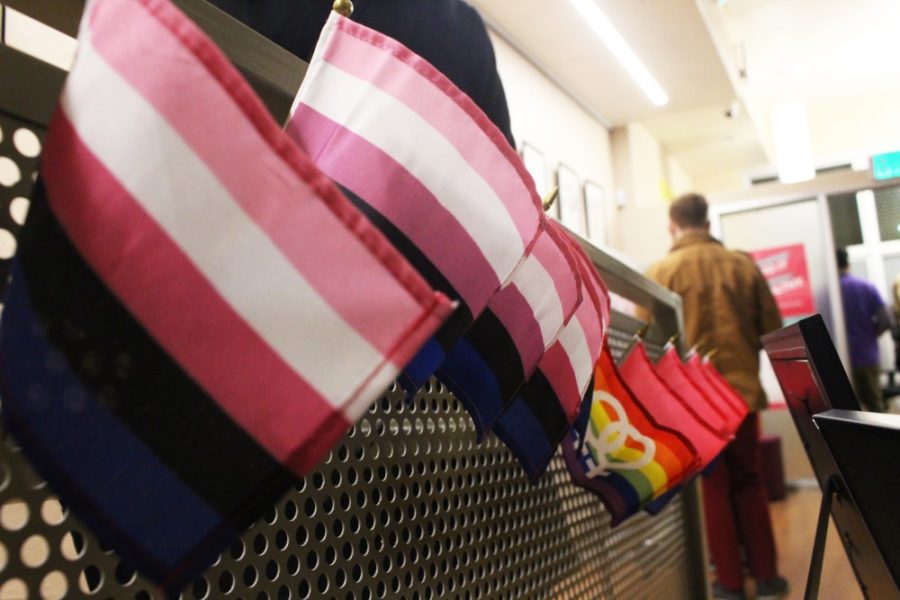University of Arizona students and staff joined members of the LGBTQ healthcare community at the first LGBTQ+ Symposium & Community Fair hosted by the UA Health Sciences’ LGBTQ+ Interest Group on Feb. 5.
UA professors, doctors and members of LGBTQ support organizations presented at the symposium on a variety of LGBTQ health topics. LGBTQ health groups set up booths for the community fair providing information on the services and support they provide.
Lydia Kennedy, director of the UAHS Office of Diversity and Inclusion, said that community outreach was an important focus of the symposium.
“Part of the symposium and working with Banner Health was making a public event where we get organizations of the community together in one place so that our campus, Banner and the community are aware of what amazing resources are available,” Kennedy said.
Kennedy saw events within the past few years as indicative of a positive change in public acknowledgement of LGBTQ health issues.
“Awareness of the importance of LGBT healthcare is huge, and it’s really gaining momentum,” Kennedy said. “You have President [Robert] Robbins, who spoke on transgender youth and how many pediatricians just aren’t prepared or don’t have the education to deal with transgender children.”
UAHS worked with Banner Health to increase their LGBTQ inclusivity.
“Healthcare is in the business of healing, not in the business of hurting,” Kennedy said about the importance of creating safe and welcoming environments for the LGBTQ community in healthcare.
According to Kennedy, Banner Health and the UA have been supportive of the UAHS LGBTQ+ Interest Group.
“The outpouring support and people who want to be included in our event has just been tremendous,” Kennedy said.
The group has more events planned for the future, and Kennedy said she hopes that the symposium and community fair will become an annual event.
Keynote speaker Susan Stryker, who is an Emmy-award winning filmmaker and UA associate professor of women’s studies, opened the symposium with a speech about being transgender during the Trump administration.
“I have a rock-bottom faith that our actions – how we live with our friends and families, work in our careers to promote health and wellbeing, justice and equality and engage in activism and advocacy – can contribute to positive change,” Stryker said about the transgender community. “But we have so much work to do.”
LGBTQ healthcare for all ages was addressed at the symposium, with presentations addressing both LGBTQ youth and adults. Russell Toomey, UA associate professor of family and consumer sciences, presented about health disparities among sexual and gender minority youths.
RELATED: ACLU Arizona suing Arizona Board of Regents over inadequate medical care for transgender employees
UA LGBTQ Affairs had a table set up at the community fair with information on resources available for UA students.
UA LGBTQ Affairs provides lounge spaces for students, hosts special events, partners with other cultural centers and offers online Safe Zone training to learn more about LGBTQ identity, according to Manuel Rodriguez, coordinator for UA LGBTQ Affairs.
“UA LGBTQ Affairs is just about directing students and community members to both resources off campus as well as places like UA Campus Health or different departments where they might get assistance,” Rodriguez said.
Rodriguez also had suggestions on how the UA can continue to improve LGBTQ inclusion and support on campus.
“Overall, the University is doing a good job, but it could always do more,” Rodriguez said. Rodriguez said that in certain areas on campus, preferred pronouns were not being used and that the UA could provide more training to faculty about LGBTQ students.
The LGBTQ Symposium and Community Fair was sponsored by Banner Health, Palo Verde Behavioral Health and UAHS Office of Diversity and Inclusion.
For more information about the UAHS LGBTQ+ Interest Group and future events, visit its website.
Follow Marquies White on Twitter









